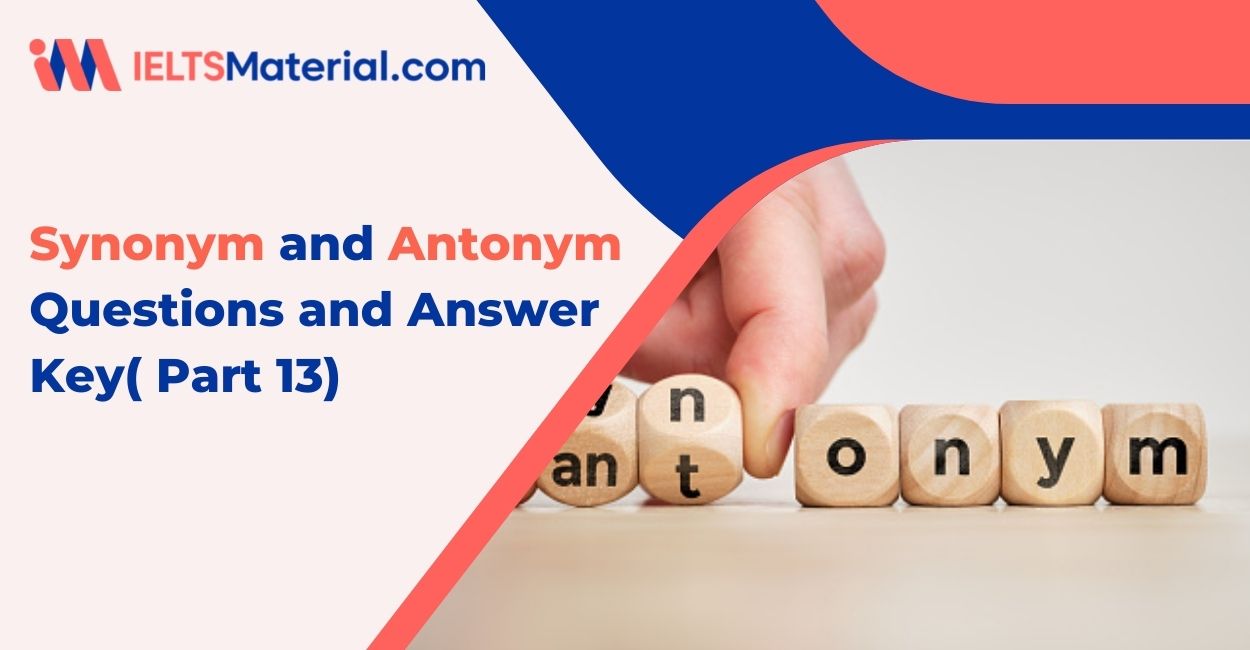Synonyms and Antonyms: Definition, Usage, Examples, and Exercise
3 min read
Updated On
-
Copy link
Table of Contents

Limited-Time Offer : Access a FREE 10-Day IELTS Study Plan!
Synonyms and antonyms are two important tools for effective communication. Knowing how to use synonyms and antonyms can help you to choose the right words to express your ideas clearly and concisely.
So let’s understand, What are Synonyms and Antonyms?
Definition of Synonym
- Synonyms are words that have the same or similar meaning. For example, the words “big” and “large” are synonyms.
Key Uses of Synonyms
- Enhancing Communication: Synonyms provide alternative words that can be used interchangeably, preventing repetition and enriching language.
- Precision in Expression: Selecting the right synonym helps convey shades of meaning, allowing you to express ideas with greater accuracy.
- Avoiding Monotony: Employing synonyms in writing and speech adds variety, making your communication more engaging and less repetitive.
Examples of Synonyms
Here are some examples of synonyms:
- big – large, huge, enormous
- happy – glad, cheerful, joyful
- fast – quick, rapid, speedy
- cold – chilly, frigid, freezing
Definition of Antonym
- Antonyms are words that have opposite meanings. For example, the words “hot” and “cold” are antonyms.
Key Uses of Antonyms
- Contrast and Comparison: Antonyms highlight differences and contrasts, making comparisons clearer and emphasizing disparities.
- Creating Impact: Antonyms are used strategically to create dramatic effects, emphasizing the stark differences between concepts.
- Exercises Critical Thinking: Exploring antonyms prompts critical thinking by forcing you to analyze concepts from opposing perspectives.
Examples of Antonyms
Here are some examples of antonyms:
- big – small, tiny, miniature
- happy – sad, unhappy, gloomy
- fast – slow, leisurely, sluggish
- cold – hot, warm, toasty
Common Usage of Synonyms and Antonyms
Synonyms and antonyms can be used in a variety of ways to improve your communication skills. Here are a few examples:
- To avoid repetition. When you use the same word over and over again in a sentence or paragraph, it can make your writing sound repetitive and boring. Using synonyms can help to add variety and interest to your writing.
- To clarify your meaning. Sometimes, a single word may not be enough to convey your exact meaning. Using synonyms can help to clarify your meaning and make sure that your readers understand what you are trying to say.
- To create emphasis. When you use a synonym that is more powerful or descriptive than the original word, it can create emphasis and make your writing more impactful.
- To add humor. Sometimes, using synonyms in a humorous way can add a touch of levity to your writing.
Check 50 Synonyms and Antonyms with their meaning and usage: Download the PDF
Practical Scenarios Where the Use of Synonyms and Antonyms is Helpful:
- Writing and Editing
- Resume and Cover Letter
- Public Speaking and Presentations
- Educational Settings
- Sales and Marketing
- Conflict Resolution
- Poetry and Creative Writing
- Language Learning
- Humor and Wordplay
- Cultural Sensitivity
Exercise
Fill in the Blank with the correct ‘Synonyms and Antonyms.’
| Question | Options |
| 1. Synonym of “benevolent” is: | a) Distant b) Cruel c) Kind |
| 2. Antonym of “humble” is: | a) Arrogant b) Modest c) Boastful |
| 3. Synonym of “arduous” is: | a) Easy b) Difficult c) Simple |
| 4. Antonym of “generous” is: | a) Stingy b) Liberal c) Abundant |
| 5. Synonym of “diligent” is: | a) Lazy b) Active c) Energetic |
| 6. Antonym of “vivid” is: | a) Colorful b) Bright c) Dull |
| 7. Synonym of “opaque” is: | a) Clear b) Transparent c) Lucid |
| 8. Antonym of “expand” is: | a) Shrink b) Enlarge c) Increase |
| 9. Synonym of “precise” is: | a) Ambiguous b) Vague c) Accurate |
| 10. Antonym of “brave” is: | a) Cowardly b) Fearless c) Bold |
| 11. Synonym of “eccentric” is: | a) Normal b) Strange c) Typical |
| 12. Antonym of “ancient” is: | a) Old b) Modern c) Antique |
| 13. Synonym of “eloquent” is: | a) Fluent b) Inarticulate c) Verbose |
| 14. Antonym of “excessive” is: | a) Abundant b) Moderate c) Extreme |
| 15. Synonym of “frugal” is: | a) Wasteful b) Thrifty c) Lavish |
| 16. Antonym of “temporary” is: | a) Brief b) Permanent c) Short |
| 17. Synonym of “obsolete” is: | a) Outdated b) Modern c) Recent |
| 18. Antonym of “expand” is: | a) Shrink b) Enlarge c) Increase |
| 19. Synonym of “eloquent” is: | a) Fluent b) Inarticulate c) Verbose |
| 20. Antonym of “courageous” is: | a) Brave b) Bold c) Fearful |
Answer Key
- c) Kind
- a) Arrogant
- b) Difficult
- a) Stingy
- a) Lazy
- c) Dull
- a) Clear
- a) Shrink
- c) Accurate
- a) Cowardly
- b) Strange
- b) Modern
- a) Fluent
- b) Moderate
- b) Thrifty
- b) Permanent
- a) Outdated
- a) Shrink
- a) Fluent
- c) Fearful
Remember, using synonyms and antonyms effectively requires a deep understanding of context and meaning. While these language tools can elevate your communication, using them haphazardly can lead to confusion or unintended messages. Always choose words thoughtfully to achieve your desired communication goals.
Also, check :

Start Preparing for IELTS: Get Your 10-Day Study Plan Today!
Recent Articles

Nitika Gupt

Nehasri Ravishenbagam

Nehasri Ravishenbagam





Post your Comments